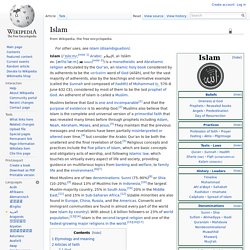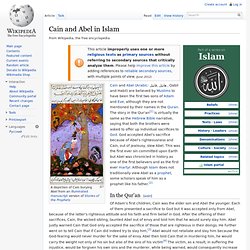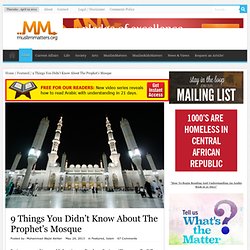

Islam. Islam (/ˈɪslɑːm/;[note 1] Arabic: الإسلام, al-ʾIslām IPA: [ælʔɪsˈlæːm] ( )[note 2]) is a monotheistic and Abrahamic religion articulated by the Qur'an, an Islamic holy book considered by its adherents to be the verbatim word of God (Allāh), and for the vast majority of adherents, also by the teachings and normative example (called the Sunnah and composed of hadith) of Muhammad (c. 570–8 June 632 CE), considered by most of them to be the last prophet of God.

An adherent of Islam is called a Muslim. Most Muslims are of two denominations: Sunni (75–90%)[8] or Shia (10–20%).[9] About 13% of Muslims live in Indonesia,[10] the largest Muslim-majority country, 25% in South Asia,[10] 20% in the Middle East,[11] and 15% in Sub-Saharan Africa.[12] Sizable minorities are also found in Europe, China, Russia, and the Americas.
Five Pillars of Islam. Importance of Modesty. Angels. Cain and Abel in Islam. Cain and Abel (Arabic: هابيل ,قابيل , Qabil and Habil) are believed by Muslims to have been the first two sons of Adam and Eve, although they are not mentioned by their names in the Quran.

The story in the Qur'an[1] is virtually the same as the Hebrew Bible narrative, saying that both the brothers were asked to offer up individual sacrifices to God. God accepted Abel's sacrifice because of Abel's righteousness and Cain, out of jealousy, slew Abel. This was the first ever sin committed upon Earth but Abel was chronicled in history as one of the first believers and as the first ever martyr. Although Islam does not traditionally view Abel as a prophet, some scholars speak of him as a prophet like his father.[2] Muhammad. Names and appellations in the Quran Sources for Muhammad's life Quran A folio from an early Quran, written in Kufic script (Abbasid period, 8th–9th century).
The Quran is the central religious text of Islam and Muslims believe that it represents the words of God revealed to Muhammad through the archangel Gabriel.[25][26][27] Although it mentions Muhammad directly only four times,[28][Quran 3:144][Quran 33:40][Quran 47:2][Quran 48:29] there are verses which can be interpreted as allusions to Muhammad's life.[14][n 4] The Quran however provides little assistance for a chronological biography of Muhammad, and many of the utterances recorded in it lack historical context.[29][30] Early biographies. Centre for the History of Arabic Studies in Europe (CHASE) - Download free content from University of London. Discourses in the Intellectual Traditions, Political Situation, and Social Ethics of Muslim Life.
Altmuslim - global perspectives on Muslim life, politics, and culture. Inside Islam - The History Channel. 9 Things You Didn't Know About The Prophet's Mosque. Seeing a scene of impeccable beauty, we often hear the term “Heaven on Earth!”

But there is only one place that literally has the right to proclaim itself heaven on Earth. There, deep in the mosque of the Prophet (masjid Nabawi), covered by green carpets and the tears of millions, lies a “garden from the gardens of paradise.” It is a place known to every Muslim who has ever lived, yet there's still much we don't know about it. Here are just some of the interesting facts and mysteries of the Prophet's Mosque: 9. When the Ottomans introduced electricity to the Arabian Peninsula, the first place to be lit up was the mosque of the Prophet . 8.
The current mosque is more than 100 times the size of the original building. . , it now borders the precincts of the current mosque grounds. 7. Room It has long been the stuff of legend that there is an “empty grave” next to where the Prophet , Abu Bakr and Umar are buried. When he returns is a matter of debate. 6. Died. 5. Grave. . Inscribed on the inside. 4.